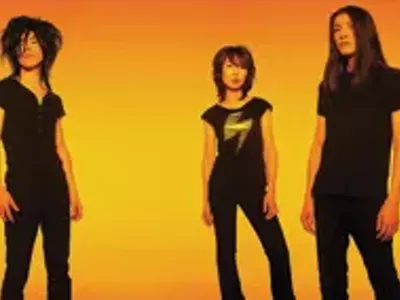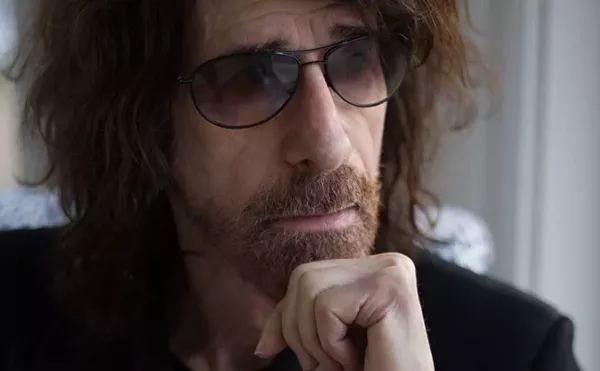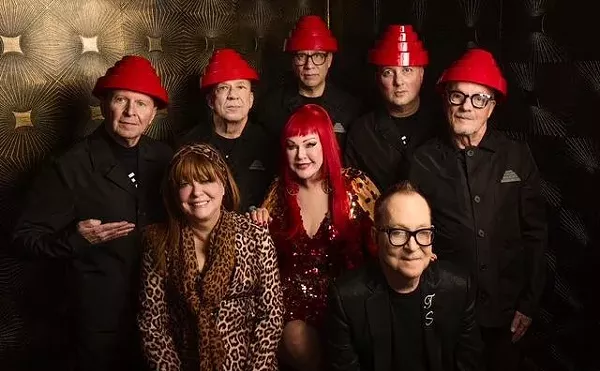
Audio By Carbonatix
[
{
"name": "GPT - Leaderboard - Inline - Content",
"component": "35519556",
"insertPoint": "5th",
"startingPoint": "3",
"requiredCountToDisplay": "3",
"maxInsertions": 100,
"adList": [
{
"adPreset": "LeaderboardInline"
}
]
}
]
This summer, Mission of Burma, a band whose original heyday was 1979 to '83, will play eight shows in the United States — two in their hometown of Boston; two in New York; and one apiece in Philly, Washington, D.C., Chicago and Detroit. Every date, save for Boston, will take place on a weekend. On four of those nights, the band will play Vs., their 1982 full-length debut LP. On the other four evenings they'll play — wrapped by songs contemporaneous to its release — Signals, Calls and Marches, their first EP, released a year earlier.
This trend — that is, classic bands performing classic albums — is a present day phenomenon and a live music marketing tool. It's also something most fans would not expect from a band apparently anathematized by bad career timing.
The shorthand history: Mission of Burma formed from the wreckage of Boston's Moving Parts in 1979. Four years later, following two singles and the aforementioned EP and album, it was over. "Official" blame for the breakup was placed on leader and Michigan expat Roger Miller's continuing battle with tinnitus (early on, he had taken to wearing rifle range-quality earphones onstage).
In the ensuing years, Miller continued playing with a number of quieter, less frenetic bands. Drummer Pete Prescott formed Volcano Suns and bought and sold vinyl behind the counter of the Back Bay's Smash City Records. Bassist Clint Conley walked his musical equipment into the closet and emerged as a mild-mannered television producer and family man.
And then, in January of 2002, Mission of Burma regrouped. No one — most notably the band — can quite explain why. But the unlikely consequence was that Burma, a band that on first go-round arrived too late to be claimed by punk and too early to reap the indie rock spoils provided by college rock radio, reunited to find themselves as relevant as ever.
"I think Sonic Youth did Daydream Nation," says guitarist and Ann Arbor native Miller in regard to the aforementioned phenomenon. "That's the first one I heard of."
Yes, just last year, brought together by longtime English festival All Tomorrow's Parties, but performed on Spanish stages, five bands (including Sonic Youth) played five albums (including Daydream Nation) from start to finish.
This summer, Liz Phair has already reclaimed 1993's Exile in Guyville four times over three cities, and even Blondie is starting its seasonal shows with a complete run-through of Parallel Lines, now 30 years young. And between July and September — between Chicago and somewhere near Woodstock, N.Y. — the Meat Puppets, Built to Spill, Tortoise, Sebadoh, Public Enemy and, of course, Mission of Burma will conduct similar experiments, following an example already set by Brian Wilson (Pet Sounds), Patti Smith (Horses), the Stooges (Funhouse) and the late Arthur Lee (Forever Changes) during the past several years.
"We're not very career-oriented," says Miller in what, at the very least, qualifies as the understatement of yet another lost Mission of Burma weekend. Miller is upstairs at New York's Bowery Ballroom, just hours before his band will plow through, convincingly and thoroughly, the extended Signals, Calls and Marches in the first of two consecutive sold-out shows.
"We just kind of stumble through stuff and things kind of happen for us. And Mark [Kates, MoB manager] suggested that, obviously with the reissues, we're going to have to do the albums."
This past March, Matador Records released "definitive editions" of all three pre-breakup Burma records (the third, The Horrible Truth About Mission of Burma, is a live recording from the band's final tour). So, in a very real sense, Vs. and Signals are the band's "latest" discs.
"We knew Mark was right," Miller says. "We do have a new record out, and when you have a new record, you tour. And that's essentially what we're doing. But it just happens to be that it's the old stuff."
When the band first reunited in '02, "the old stuff," by definition, made up the entirety of the Mission of Burma set list. But they didn't perform the records so neatly wrapped with figurative ribbons and allegorical bows. That is, to say, from start to finish and so stringently self-contained.
"We certainly never ever did that," Miller admits. "I mean, it is weird. We're conscious that it's kind of an artifice." But, he says, "sometimes I think it hardly matters what we play. For people who like Mission of Burma, we could play any song. It's not really that important because it's just this thing we do with our songs. That's kind of how it feels. So like now we're doing Vs. from start to finish. Well, that's kind of bizarre. But, you know, it's as good of a set as what we did last fall. It's no better, no worse. It's just different."
Although the Pitchfork Festival in Chicago precedes the band's Detroit show by just 24 hours, paid more money and thus justifiably drew first choice for a performance of Vs., the guitarist points out that the reissued Signals "has more of our 'hits' on it." He means songs like Miller's "This is Not a Photograph," Conley's deliciously pop-punk "Academy Fight Song" and the much-covered "That's When I Reach for My Revolver," songs that are even more raw than the expansive full-length LP that followed. So perhaps it's not surprising that, in addition to prominently poor timing, Mission of Burma's first run yields yet another legacy — on any given night they could serve as either the best or worst band you'd ever seen.
Miller agrees that early Burma was, in fact, "legendarily erratic. I've heard [tapes of] live shows from 1982, which is after we recorded Vs., and, you know, we're just like blurring between these riffs. And they're really complicated riffs that are slightly irrational so it just sounds like chaos.
"Now we're playing a little slower because we're older and it's inherent that we're going to play a little slower because we're no longer in our 20s. It's not that much slower, but it's just slower enough so that we hammer each one of those changes rather than blurring through them."
That gain in precision sans resulting loss of puissance is but one argument that, artifice or not, today's Mission of Burma is likely better equipped than even their former selves to lay claim to the emphatically energetic material first performed more than a quarter-century before.
"We're more comfortable, I think, with ourselves now, you know, as a band," Miller concludes. "In those days, it was always, like, all edgy and stuff. That's kind of gone. Now, we're just amazed that we're playing at all so it's more comfortable. We have nothing to prove in a way."
Mission of Burma plays with SSM Saturday, July 19, at the Bohemian National Home, 3009 Tillman St., Detroit; 313-737-6606; soors 9 p.m.; tickets $18 or $15 in advance.





